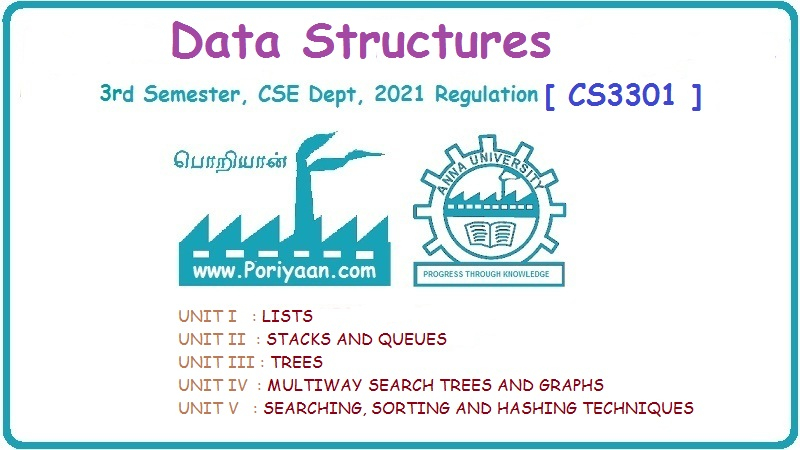Data Structure: Unit IV : Multiway Search Trees and Graphs
Two marks Questions with Answers
Multiway Search Trees and Graphs | Data Structure
B-tree is a multiway search tree of order m is an ordered tree where each node has at the most m children.
5.16 Two Marks
Questions with Answers
Q.1What are B-trees ?
Ans. : B-tree is a multiway
search tree of order m is an ordered tree where each node has at the most m
children. If there are n number of children in a node then (n - 1) is the
number of keys in the node.
Q.2 Enlist the properties of B-trees
Ans; The B-tree of order m
should be constructed using following properties.
Rule 1: All the leaf nodes are on
the botom level.
Rule 2: The root node should have
at least two children.
Rule 3: All the internal nodes
except root node have at least ceil (m/2) nonempty children. The ceil is a
function such that ceil (3.4) = 4, ceil (9.3) = 10,
ceil (2.98)
= 3 ceil (7) = 7.
Rule 4: Each leaf node must contain
at least ceil (m/2) - 1 keys.
Q.3 What are the various operations that can be
performed on B-trees ?
Ans. : Various operations that
can be performed on B-Tress are
1. Creation of B-Tree
2. Insertion
of a node in B-Tree
3.
Deletion of particular node from B-Tree
4.
Searching a specific key value from B-Tree.
Q.4 What are the properties of binomial heaps.
1. The
binomial heaps obey the min-heap or max-heap property.
2. For
any non negative integer m, there is at the most one binomial tree in H whose
root has degree m.
Q.5 Define a graph.
Ans. : A graph is a collection of
two sets of V and E where V is finite non empty set of vertices and E is a
finite non empty set of edges.
Vertices
are nothing but the nodes in the graph and two adjacent vertices are joined by
edges.
The
graph is denoted by G = {V, E}.
Q.6 What are the storage representation of the
graph? Or
What are
different ways to represent the graph.
Ans. : The graph can be
represented by using arrays or linked list.
1. The
adjacency matrix is a storage representation of the graph by which the graph is
stored in two dimensional arrays.
2. The
adjacency list is a storage representation of a graph by which the graph is
stored in linked list.
Q.7 What are the applications of graph?
Ans. The graph theory is used
widely in the computer science very widely. The applications of graph theory
are -
1. In
computer networking such as Local Area Network (LAN), Wide Area Networking
(WAN) internetworking the graph is used.
2. In
telephone cabling graph theory is effectively used.
3. In
job scheduling algorithms the graph is used.
Q.8 Prove that the number of odd degree
vertices in a connected graph should be even.
Ans; To prove this, consider
connected graphs with odd degree vertices.
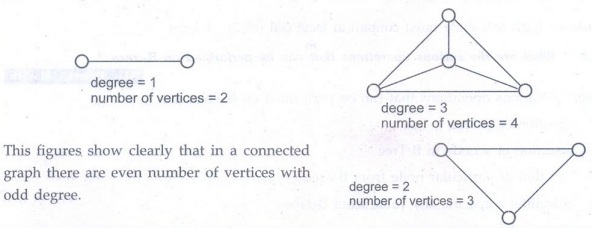
Q.9 What is an activity node graph?
Ans. : A graph in which vertices
represent activities is called. an activity-node graph. In activity node graph
the vertex is a weighted vertex.
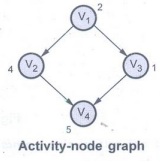
In this
graph vertex V1 represents the beginning activity. The vertices V2 and a har V3
can be carried out in parallel. And finally activity at V4 can be performed.
Q.10 Define a graph. How it differs from tree?
Ans. : A graph is a collection
of two sets of V and E where V is a finite non empty set of vertices and E is a
finite non empty set of edges. Thus a graph is denoted by G = (V,E).
Thus
graph and trees are both non-linear data structures but in trees there is
special" node called root and in graph there is no root node.
Q.11 What is breadth first traversal?
Ans. : The breadth first
traversal is a type of traversal in which the nodes on each level are
displayed. For example
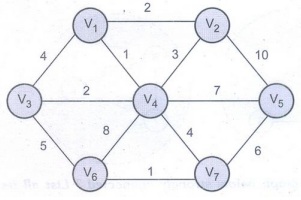
The BFS
traversal is: V1 V2 V3 V4 V6 V7
Q.12 When a graph is said to be bipartite ?
Ans. : A bipartite graph (or
bigraph) is a graph whose vertices can be divided into two disjoint sets U and
V such that every edge connects a vertex in U to one in V. A bipartite graph is
a graph that does not contain any odd-length cycles.
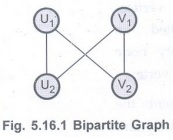
Q.13 What are articulation points ?
Ans. : Let G = (V,E) be a
connected undirected graph, then an articulation point of graph G is a vertex
whose removal disconnects graph G. This articulation point is a kind of
cut-vertex.
For
example
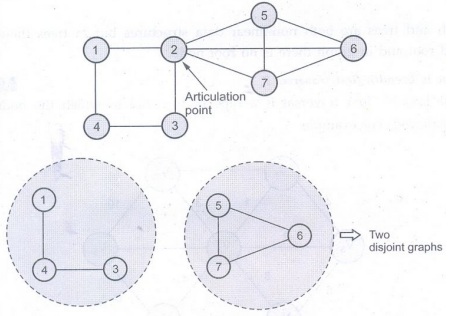
Q.14 Is the directed graph below strongly
connected? List all its simple paths.
Ans. : Yes. Given graph is
strongly connected, because all the nodes of a subgraph are reachable by all
other nodes in the subgraph.
The
simple paths are -
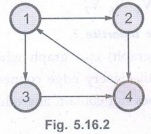
1) 1, 2,
4.
2) 1, 3,
4.
3) 2, 4, 1.
4) 2, 4, 1, 3.
5) 3,4
6) 3, 4,
1.
7) 3, 4, 2.
8) 4, 1, 2.
9) 4, 1,
3.
Q.15 Define regular graph.
Ans. : A regular graph is a kind
of graph in which the degree of each vertex is the same. For example
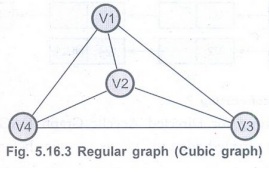
Q.16 What is weakly connected graph?
Ans. : A directed graph is called
weakly connected graph when all the directed edges within a diagraph are
replaced by undirected edges and produce an undirected graph in which there is
a path from every node to every another node. For example –
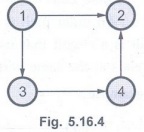
Q.17 Find the adjacency matrix and adjacency list for the following graph.
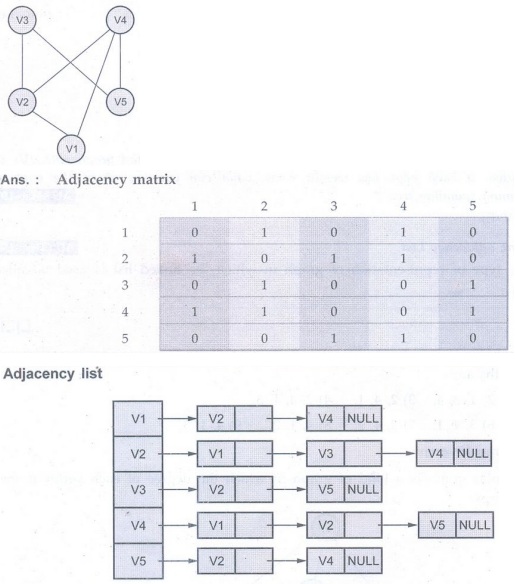
Q.18 What is topological sorting?
Ans; Topological sorting for
Directed Acyclic Graph (DAG) is a linear ordering of vertices such that every
directed edge uv, vertex u comes before v in ordering.
Q.19 Define Euler circuits.
Ans. : An Euler path is a path
that uses every edge of a graph exactly once. An Euler circuit is a circuit
that uses every edge of a graph exactly once. An Euler circuit starts and ends
at the same vertex.
For
example:
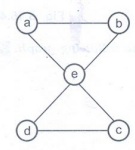
Q.20 What is Bi-connectivity ?
Ans. :
Biconnected graphs are the graphs which can not be broken into two disconnected pieces (graphs) by connecting single edge. For example :
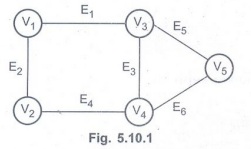
Q.21 Given a weighted undirected graph with IV
nodes, Assume all weights are non negative. If each edge has weight <=w,
what can you say about the cost of Minimum spanning tree ?
Ans. : O
(V+E).
Q.22 Define adjacency List.
Ans; The type of representation
of graph in which the linked list is used is called adjacency list.
Data Structure: Unit IV : Multiway Search Trees and Graphs : Tag: : Multiway Search Trees and Graphs | Data Structure - Two marks Questions with Answers
Related Topics
Related Subjects
Data Structure
CS3301 3rd Semester CSE Dept | 2021 Regulation | 3rd Semester CSE Dept 2021 Regulation
